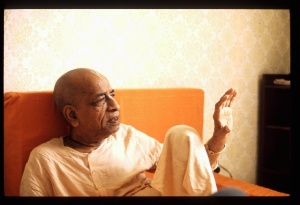SB 11.11.46

A.C. Bhaktivedanta Swami Prabhupada
Please note: The synonyms, translation and purport of this verse were composed by disciples of Śrīla Prabhupāda
TEXT 46
- dhiṣṇyeṣv ity eṣu mad-rūpaṁ
- śaṅkha-cakra-gadāmbujaiḥ
- yuktaṁ catur-bhujaṁ śāntaṁ
- dhyāyann arcet samāhitaḥ
SYNONYMS
dhiṣṇyeṣu—in the previously mentioned places of worship; iti—thus (by the previously mentioned processes); eṣu—in them; mat-rūpam—My transcendental form; śaṅkha—with the conchshell; cakra—Sudarśana disc; gadā—club; ambujaiḥ—and lotus flower; yuktam—equipped; catuḥ-bhujam—with four arms; śāntam—peaceful; dhyāyan—meditating; arcet—one should worship; samāhitaḥ—with complete attention.
Translation and purport composed by disciples of Śrīla Prabhupāda
TRANSLATION
Thus, in the previously mentioned places of worship and according to the processes I have described, one should meditate on My peaceful, transcendental form with four arms holding a conchshell, Sudarśana disc, club and lotus flower. In this way, one should worship Me with fixed attention.
PURPORT
The Lord has previously explained that He appears in different transcendental forms to His pure devotees so that they may unlimitedly increase their love of Godhead. Here is given a general description of the four-armed Nārāyaṇa form, which pervades the material world as Supersoul, or Paramātmā. The pure devotees, however, do not meditate upon the Lord within the heart but rather render active service to a specific form of the Lord, such as Rāma or Kṛṣṇa, and thus perfect their realization of Bhagavān, or the Supreme Lord, who engages in transcendental pastimes with His devotees in the spiritual world. Yet even within the material world one can spiritualize one's existence by seeing the Supreme Lord within everything and worshiping Him by constant meditation. As mentioned in the previous verses, one should also go to the temple and specifically worship the Deity and participate in spiritual festivals. One should not be puffed up and claim that because one is meditating on the Lord within nature there is no need to go to the temple. Temple worship has been repeatedly emphasized by the Lord Himself. The word samāhita in this verse indicates samādhi. If one very carefully worships the Deity or hears and chants about the pastimes of Lord Kṛṣṇa, one is certainly in samādhi. By worshiping and glorifying the Lord twenty-four hours a day one becomes a liberated soul and gradually rises completely beyond the influence of the material creation. The living entity is called ātmā, or eternal soul, because of his relationship with the Paramātmā, the Supreme Personality of Godhead. By worshiping the Lord, our eternal nature revives, and as we increase our enthusiasm and steadiness in devotional service, material existence fades away.